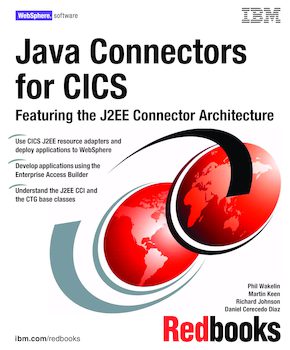Java Connectors for CICS: Featuring the J2EE Connector Architecture
An IBM Redbooks publication
Note: This is publication is now archived. For reference only.

Published on 22 March 2002
ISBN-10: 0738423904
ISBN-13: 9780738423906
IBM Form #: SG24-6401-00
Authors: Phil Wakelin, Martin Keen, Richard Johnson and Daniel Cerecedo Diaz
What is the best method for connecting a Java application to CICS? There are a wealth of options that are available, ranging from using the Java class libraries that are shipped with the CICS Transaction Gateway (CTG), to using the Common Client Interface (CCI) component of the Java 2 Enterprise Edition (J2EE) Connector Architecture. There are also important application development choices to make, such as whether to code to an API directly, or to use a tool such as VisualAge for Java’s Enterprise Access Builder.
This IBM Redbooks publication examines the strategic Java connection methods for CICS. The focus is on the use of the J2EE Connector Architecture, which is a new Java standard for connecting to legacy Enterprise Information Systems such as CICS. This builds upon the previous IBM Common Connector Framework (CCF) and provides enhanced facilities for deploying into a managed environment, where connection pooling, transactions, and security are managed by a J2EE capable application server such as WebSphere Application Server.
We provide comprehensive code examples for the J2EE CCI, as well as the CTG base classes, including the ECIRequest, ESIRequest, and the EPI support classes.
Part 1. Introduction
Chapter 1. Java connectors for CICS
Chapter 2. CICS Transaction Gateway
Chapter 3. CICS and the J2EE Connector Architecture
Part 2. Connecting to COMMAREA based CICS programs
Chapter 4. ECI and ESI applications
Chapter 5. CCI applications: ECI based
Chapter 6. CCI applications in a managed environment
Part 3. Connecting to 3270 based CICS transactions
Chapter 7. EPI support classes
Chapter 8. CCI applications: EPI based
Part 4. Appendices
Appendix A. Configuring the CICS connectors in VisualAge for Java
Appendix B. Data conversion
Appendix C. Sample CICS programs
Appendix D. Additional material